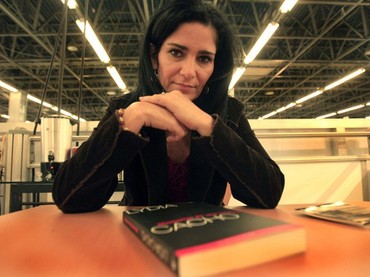My response to this short online news piece in relation to violent societies appears below in English:
México: Exigen protección para periodista Lydia Cacho
El Comité para la Protección de Periodistas se manifestó sobre las nuevas amenazas de muerte que la periodista y defensora de derechos humanos Lydia Cacho recibió el pasado 28 de julio debido a su labor informativa.
El CPJ pidió a las autoridades mexicanas investigar esta nueva amenaza y solicitó protección para la periodista, señaló el diario El Informador.
Cacho se encontraba escribiendo en su estudio cuando recibió la advertencia: “No te metas con nosotros o te vamos a mandar a casa en pedacitos”.
El mensaje fue filtrado a través del sistema de radiocomunicación instalado en su casa en Cancún, informó la organización.
La Comisión Interamericana de Derechos Humanos (CIDH), en 2009, otorgó medidas cautelares a la periodista tras darse a conocer varios actos de vigilancia e intimidación por parte de hombres armados.
Article19 también hizo un llamado al Estado mexicano para que se hagan efectivas las medidas dispuestas por la CIDH para proteger a la periodista.
Según Article 19, Lydia Cacho ya se encuentra a salvo fuera de la ciudad de Cancún.
-----------------------------------------------------------------------------------------------
Apart from highlighting the power of social media this news piece is just one amongst many that demonstrates the normalisation of violence in Mexican society. Sometimes I find it difficult to write about direct violence in Mexico and/or in Chiapas more specifically because I worry about being complicit to a polemic that can have negative results and stereotype a nation.
Although I am always aware of what can happen and have evidenced some violent and dramatic scenes during my time in Mexico, I have experienced love, community solidarity, trust and respect on just as many levels. I supposed this comes down what I have always written about Mexico - it is a country of mega extremities - when it is good it is amazing and when it is bad it is horrific. At least with that you always know where you are.
The article above is in relation to investigative journalist Lydia Cacho (@lydiacachosi) one of Mexico's most hard working, consistent and brave women who writes about and speaks out for women's rights and anti-corruption.
In brief she was kidnapped by public security and arrested in 2003 for writing articles and later a book called Los Demonios del Edén (The Demons of Eden) which included narratives of abused girls and named men involved in a paedophile ring. In 2006 she published a book on the impunity and femicide in Cuidad Juarez of which she continues to be very vocal today. And now according to reports she is being threatened again by not so brave cobardes who shout anonymous threats from hidden places.
The suspected involvement of local politicians and security forces on previous violations of her human rights to live unharmed and peacefully as any other citizen of the world must make it difficult to know who to trust. My ears always prick up at the mention these stories of journalists in danger in Mexico as this is the career my husband once chose, for which he too received threats and witnessed corruption on a regular basis - albeit on a smaller scale. I remember the BBC once reporting that Mexico was second to Iraq in being the most dangerous place in the world to be a journalist, I remember it most vividly because at that time I was back in the UK fearing that I might never see my life partner again. He lost faith in the world of journalism because of his junior experience and vowed never to return to it. It appears that as with everything in that amazingly, dramatic and lively country you are left to choose between extremes - be part of the corruption that only prints what the politicians and high end society tell you to or stand against it and have you and your family receive regular death threats and at worst be murdered.
I wrote and presented a paper at the end of 2011 about gendered violence and reproductive healthcare in Chiapas. In this paper I began to explore the notion of how high levels of violence in society reflected not high levels of structural violence but direct violence in reproductive healthcare settings. This was followed up earlier this year by another paper presented on Barcelona and a following article (all published in edited versions on this blog) on the impact of militarisation on gendered violence and reproductive health.
As disturbing as continued reports of violence, impunity and corruption in Mexico are in the world media are, they serve to remind me that hopefully I am not alone in thinking that part (though not all) of the catalysts behind the poor treatment of women during pregnancy and labour, and in health services in general, are connected to the wider violent actions (and acceptance) of a society.
A more important reason personally to pay attention to violence in Mexico, without sensationalising and demonising a nation is precisely because my extended family, children, friends and strangers that I have experience of cannot be further (in the extreme) from this phenomenon.

No comments:
Post a Comment